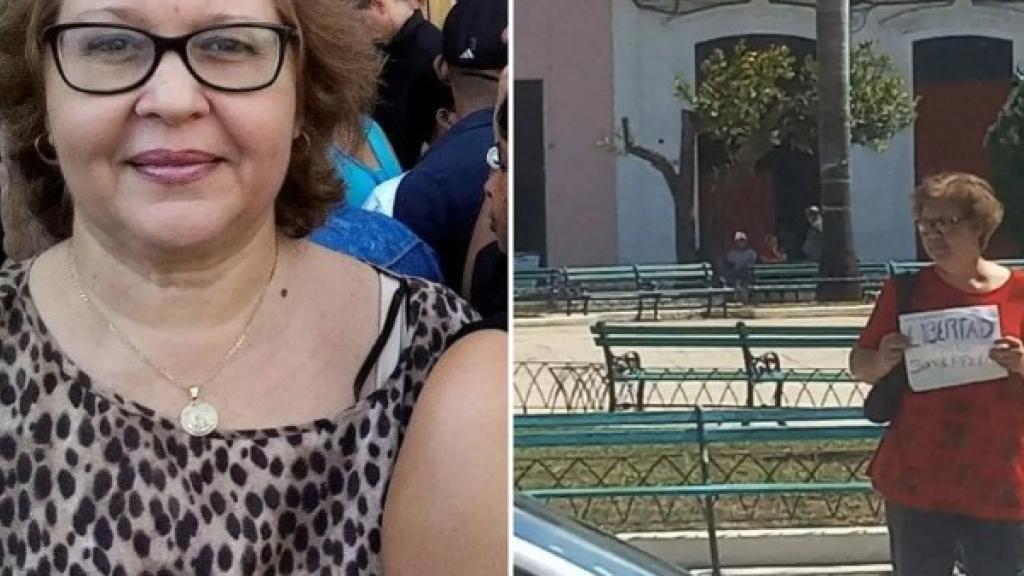Alina Bárbara López: ‘In Cuba there is a general crisis, a systemic crisis’

First published at EFE. Translation by LINKS International Journal of Socialist Renewal
In Cuba you can be on the left while criticizing the government and the system. You can denounce the US blockade and add that it does not justify everything. And you can advocate for a greater understanding with the US while arguing that Havana’s priority really should be talking to its own citizens.
This is the position — complex, articulated and not always understood in the polarized Cuban political context — that Cuban intellectual Alina Bárbara López Hernández laid out in an interview with EFE. López is a historian, philosopher, essayist and editor, who is a member of the Cuban Academy of History.
The interview took place before she was temporarily detained this Thursday [April 6] after protesting in a park against the detention of journalist and writer Jorge Fernández Era. Both were later released after being held for a few hours.
"Cuba is in the last stages of a political, social and economic model that I do not think can be reformed under these conditions," says López. She does not think that the island can follow the path of economic opening that was adopted in China and Vietnam.
"Until perhaps a few decades ago, an economic reform alone might have sufficed. But that is no longer possible. Now there is a general crisis, a systemic crisis, which includes not only the economic dimension, but also the political, social and the symbolic dimensions," she argues.
She points to multiple factors ranging from internal political contradictions, such as those generated by the adoption of a new constitution in 2019; "mass access" to the Internet (mobile data services became available in 2018); "repression in various forms" and the upturn in inequality and "poverty", including “extreme poverty”.
"The government has been unable to turn the economic situation around. People who for a long time had no political concerns, now are worried. Because there is nothing that turns a person more toward politics than poverty and a situation of instability and insecurity going forward like the one that Cubans face today," she notes.
As a historian, she is "optimistic" about the future of Cuba, although "in the short term" she does not see "any possibility" of change if the Cuban people do not do "something to change" the situation. Hers is a "socialist ideal". She holds that this "should be a conscious decision", not one that is imposed and with "only a single party".
Dialogues
López supports "any dialogue" between Cuba and the United States. But she warns Washington that "no pressure on another government is legitimate". She believes that Havana’s goal in a possible rapprochement is "to achieve transformations that lead to an economic opening under its control".
In short, she says, "I think that any type of conversation that leads to an improvement in relations and the end of the [economic] blockade is very positive".
López criticizes US sanctions against the island and believes that it is "really unfair" that Cuba was included in the US list of countries sponsoring terrorism. At the same time, López considers that Havana uses the embargo as the "sole excuse" and that its elimination would not automatically lead to the democratization of the country.
That said, she emphasizes that the fundamental dialogue lies elsewhere: "Both the Cuban and United States governments see the Cuban people as little more than juveniles. The US does not understand that the issue is not that the Cuban government must come to an agreement with them; it is that the Cuban government must talk with us, the citizens".
She adds that for her the Cuban government is a valid interlocutor because "it holds power", although she emphasizes that "it must be pressured from below to speak". She warns that refusing dialogue with the government and advocating other ways to bring about change "is to ask for an armed uprising".
Taking action
After a life as an essayist and convinced that intellectuals must "add their voices", López insists that "wagering on Cuba" is a "public duty".
With this perspective, on March 18 she staged a peaceful public act of political protest to demand that the government release political prisoners, end repression and provide aid to the most vulnerable sectors of the population, among other issues.
She broadcast the gesture live on social networks from the Parque de la Libertad in her home city of Matanzas, the same park where she staged her protest this Thursday. She notes that she was not "disturbed" by others and that her initiative, which she aims to repeat every month, has aroused interest.
"I will do it on the 18th of every month. There are already people who tell me that they are also going to go out in parks in their cities. I did not summon anyone, but I am not going to reject anyone who turns up and wants to sit with me. I am not going to shout any slogan, I'm not going to raise any placard", she explains.
Women
López believes that the Cuban revolution brought with it "positive issues" for women. Among them she highlighted "equal salaries" for women and special measures to protect maternity.
However, she adds that "there is still a lot to do" in this area and that she does not detect "an obvious intention to implement these things that are so important, at least in the short term."
On that to-do list, she emphasizes the absence of both a law on gender and official statistics on femicide, two of the most frequent demands being put forward by independent feminist groups.
Lopez also denounced the absence of shelters for female victims of sexist violence, the lack of aid for single-parent families, and that the maternal mortality rate has risen in recent years following cuts in public obstetric services.